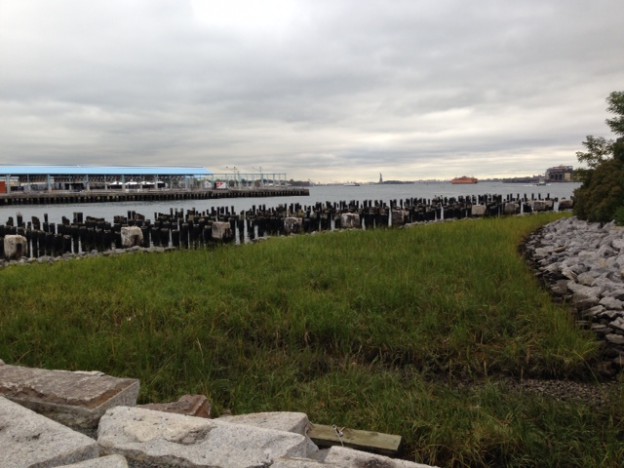By: Veronika Shalska, Jeffery Grannum, Marilyn Marte, Victoria Kitsos, Dylan Dai.
Definition of Eco-Tourism- Even though Eco-tourism is primarily associated with endless spaces of destinations where its flora and fauna are key attractions, the Brooklyn waterfront can be a good substitute for those who want to enjoy natural environment within urban limits. Eco-Tourist love to go to natural environment’s that are being threatened and go support those environment’s as much as they can. By going to Brooklyn Bridge Park these tourist can be involved with the ecosystem of the Hudson River. For years it has been said to be one of the most polluted waters. But now that’s all changing, with all the teaching programs and fun activities they have to offer.
Brooklyn Bridge Park- By: Veronika Shalska.
Eco-tourism main’s purpose is to educate the tourists about the ecological conservation, and to focuses more on individual values. The International Eco-tourism Society (TIES) defines Eco-tourism as “responsible travel to natural areas that conserves the environment and improves the well-being of local people’’ basically Eco-tourism deals with living parts of a natural environment where flora, cultural heritage, and fauna are the main attractions in a tourist place. Therefore Brooklyn Bridge Park is huge on saving energy. This park encourages people to travel by walking, biking, taking the ferry, or taxi water throughout the park in order to save gas, energy, and decrease pollution. This park also provides a sustainable energy source there are a lot of storage tanks built underground where it holds thousands gallons of water for the purpose of conservation. This park is all surrounded by natural environment. The park also has an energy center that has solar energy panel that provides about 80% of the energy needed in the park. All these elements provide a complete package for tourism, especially for Eco-tourism.
Brooklyn Bridge Park Conservancy Program- Jeffery Grannum
The Brooklyn Bridge Park Conservancy (BBPC) has made a major commitment to transforming the Brooklyn waterfront. That commitment has resulted in a seamless blend of modern landscaping and beautiful plant life. Trees and plants from across North America, like the iconic red and green crimson clover, were carefully chosen to match New York City’s climate. The park and its vegetation are also a huge source of ecotourism. The park relies on volunteers to guide free tours of the parks. This not only showcases the waters diverse and beautiful plant life but also brings attention and more importantly business to the waterfront.
One of the activities is visiting the park to learn about marine life. The Brooklyn Bridge Park Conservancy offers education programs that introduce children and adults each year to the habitats of the New York harbor and East River estuary. Marine scientists use a seining net to catch and identify the remarkable creatures of the East River. Since the program began, participants have discovered a variety of marine life including oyster toad fish, horseshoe crabs, lined seahorses, and jellyfish.
Columbia Waterfront Park – By: Marilyn Marte.
A planned green space on a roughly two-acre property that extends from Kane Street to Degraw Street on the west side of Columbia Street. The park visitors became enthusiastic volunteers to help with spreading compost, laying seed, and covering the seeded area with jute mats. Columbia Waterfront Park is part of the Initiative’s effort to restore native plant communities and the ecosystems they support.
Salt marshes on piers are biologically productive ecosystems. Planted with Smooth cordgrass, the marshes create a fantastic habitat for ducks and other waterfowl that eat and live in the grass, along with many crustaceans and bivalves. The spiral pool at Pier 2 creates a gently descending, stabilized entry point that allows visitors direct access to the water. It also serves as a boat launch. The beach areas at Main Street are currently home to the largest diversity of species. The gentle slopes allow species to flourish within the inter tidal area. Granite steps to the water allow access for visitors.
The Red Hook Boaters- By: Victoria Kitsos
While kayaking on the Hudson River you get to enjoy beautiful scenery, from the skylines of New York City, to the Statue of Liberty. This is all free of cost. The only thing they ask for when you go kayaking is to pick up any trash that you come across. This is not only an inexpensive way to see the views of the city, but you get to help our ecosystem grow. This opportunity is available from June 7th to August 31st. Every Saturday from 10:00AM to 3:00PM and Thursday from 5:30PM to 6:45PM. This activity is one of the few activities that help to benefit our ecosystem. There are tour boats that travel all up and down the harbor to see the exact thing you can see when you go kayaking. The only thing is they are polluting the water because those boats run off of fuel. By doing this you can help not only make the waters cleaner but our educational programs can benefit from this too, by searching the ecosystem for fish instead of finding trash.
Brooklyn Waterfront Green-way– By: Dylan Dai.
A 14-mile landscaped route for pedestrians, runners and cyclists that will connect neighborhood parks and open spaces from Green point to Bay Ridge. It will incorporate green infrastructure elements and function as a commuter and recreation route for Brooklyn residents and tourists alike. Five miles of the Green way are already in place, including Kent Avenue, Flushing Avenue, Brooklyn Bridge Park, Columbia Street, and the northern end of Van Brunt St . Two additional miles along West Street and around the Brooklyn Navy Yard are now being designed.




